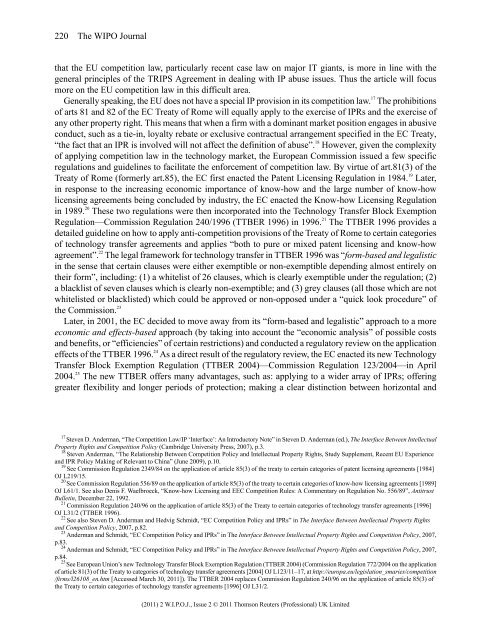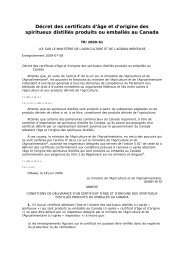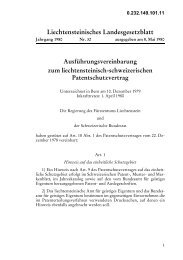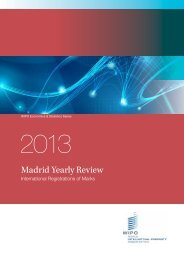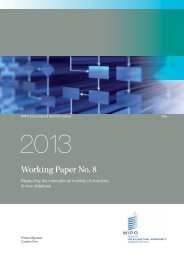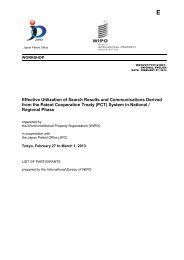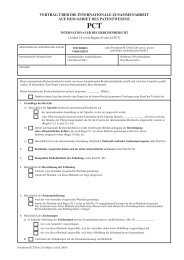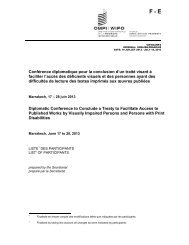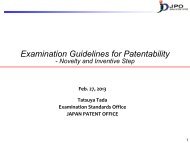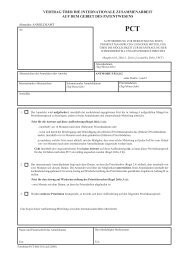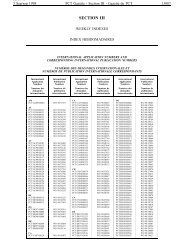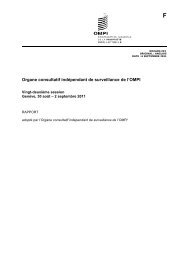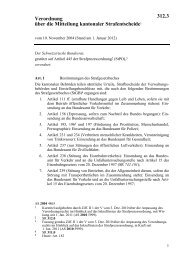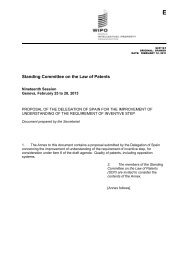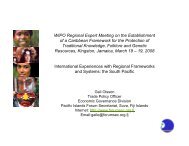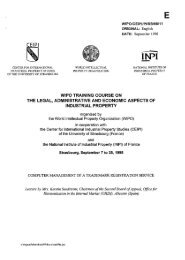WIPO Journal - World Intellectual Property Organization
WIPO Journal - World Intellectual Property Organization
WIPO Journal - World Intellectual Property Organization
You also want an ePaper? Increase the reach of your titles
YUMPU automatically turns print PDFs into web optimized ePapers that Google loves.
220 The <strong>WIPO</strong> <strong>Journal</strong><br />
that the EU competition law, particularly recent case law on major IT giants, is more in line with the<br />
general principles of the TRIPS Agreement in dealing with IP abuse issues. Thus the article will focus<br />
more on the EU competition law in this difficult area.<br />
Generally speaking, the EU does not have a special IP provision in its competition law. 17 The prohibitions<br />
of arts 81 and 82 of the EC Treaty of Rome will equally apply to the exercise of IPRs and the exercise of<br />
any other property right. This means that when a firm with a dominant market position engages in abusive<br />
conduct, such as a tie-in, loyalty rebate or exclusive contractual arrangement specified in the EC Treaty,<br />
“the fact that an IPR is involved will not affect the definition of abuse”. 18 However, given the complexity<br />
of applying competition law in the technology market, the European Commission issued a few specific<br />
regulations and guidelines to facilitate the enforcement of competition law. By virtue of art.81(3) of the<br />
Treaty of Rome (formerly art.85), the EC first enacted the Patent Licensing Regulation in 1984. 19 Later,<br />
in response to the increasing economic importance of know-how and the large number of know-how<br />
licensing agreements being concluded by industry, the EC enacted the Know-how Licensing Regulation<br />
in 1989. 20 These two regulations were then incorporated into the Technology Transfer Block Exemption<br />
Regulation—Commission Regulation 240/1996 (TTBER 1996) in 1996. 21 The TTBER 1996 provides a<br />
detailed guideline on how to apply anti-competition provisions of the Treaty of Rome to certain categories<br />
of technology transfer agreements and applies “both to pure or mixed patent licensing and know-how<br />
agreement”. 22 The legal framework for technology transfer in TTBER 1996 was “form-based and legalistic<br />
in the sense that certain clauses were either exemptible or non-exemptible depending almost entirely on<br />
their form”, including: (1) a whitelist of 26 clauses, which is clearly exemptible under the regulation; (2)<br />
a blacklist of seven clauses which is clearly non-exemptible; and (3) grey clauses (all those which are not<br />
whitelisted or blacklisted) which could be approved or non-opposed under a “quick look procedure” of<br />
the Commission. 23<br />
Later, in 2001, the EC decided to move away from its “form-based and legalistic” approach to a more<br />
economic and effects-based approach (by taking into account the “economic analysis” of possible costs<br />
and benefits, or “efficiencies” of certain restrictions) and conducted a regulatory review on the application<br />
effects of the TTBER 1996. 24 As a direct result of the regulatory review, the EC enacted its new Technology<br />
Transfer Block Exemption Regulation (TTBER 2004)—Commission Regulation 123/2004—in April<br />
2004. 25 The new TTBER offers many advantages, such as: applying to a wider array of IPRs; offering<br />
greater flexibility and longer periods of protection; making a clear distinction between horizontal and<br />
17<br />
Steven D. Anderman, “The Competition Law/IP ‘Interface’: An Introductory Note” in Steven D. Anderman (ed.), The Interface Between <strong>Intellectual</strong><br />
<strong>Property</strong> Rights and Competition Policy (Cambridge University Press, 2007), p.3.<br />
18<br />
Steven Anderman, “The Relationship Between Competition Policy and <strong>Intellectual</strong> <strong>Property</strong> Rights, Study Supplement, Recent EU Experience<br />
and IPR Policy Making of Relevant to China” (June 2009), p.10.<br />
19<br />
See Commission Regulation 2349/84 on the application of article 85(3) of the treaty to certain categories of patent licensing agreements [1984]<br />
OJ L219/15.<br />
20<br />
See Commission Regulation 556/89 on the application of article 85(3) of the treaty to certain categories of know-how licensing agreements [1989]<br />
OJ L61/1. See also Denis F. Waelbroeck, “Know-how Licensing and EEC Competition Rules: A Commentary on Regulation No. 556/89”, Antitrust<br />
Bulletin, December 22, 1992.<br />
21<br />
Commission Regulation 240/96 on the application of article 85(3) of the Treaty to certain categories of technology transfer agreements [1996]<br />
OJ L31/2 (TTBER 1996).<br />
22<br />
See also Steven D. Anderman and Hedvig Schmidt, “EC Competition Policy and IPRs” in The Interface Between <strong>Intellectual</strong> <strong>Property</strong> Rights<br />
and Competition Policy, 2007, p.82.<br />
23<br />
Anderman and Schmidt, “EC Competition Policy and IPRs” in The Interface Between <strong>Intellectual</strong> <strong>Property</strong> Rights and Competition Policy, 2007,<br />
p.83.<br />
24 Anderman and Schmidt, “EC Competition Policy and IPRs” in The Interface Between <strong>Intellectual</strong> <strong>Property</strong> Rights and Competition Policy, 2007,<br />
p.84.<br />
25 See European Union’s new Technology Transfer Block Exemption Regulation (TTBER 2004) (Commission Regulation 772/2004 on the application<br />
of article 81(3) of the Treaty to categories of technology transfer agreements [2004] OJ L123/11–17, at http://europa.eu/legislation_smaries/competition<br />
/firms/l26108_en.htm [Accessed March 30, 2011]). The TTBER 2004 replaces Commission Regulation 240/96 on the application of article 85(3) of<br />
the Treaty to certain categories of technology transfer agreements [1996] OJ L31/2.<br />
(2011) 2 W.I.P.O.J., Issue 2 © 2011 Thomson Reuters (Professional) UK Limited


